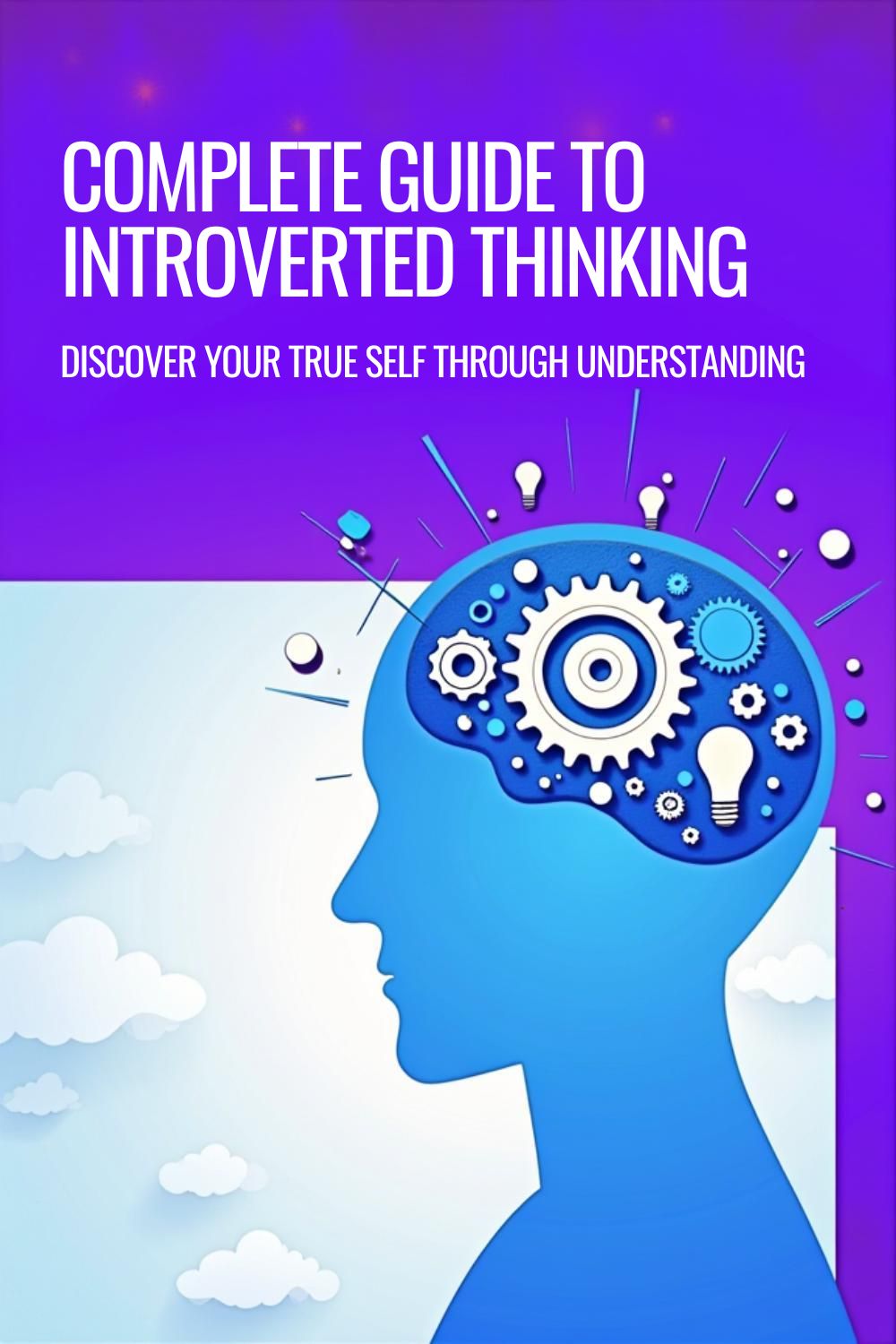Disclaimer: This post may contain affiliate links, meaning we get a small commission if you make a purchase through our link at no extra cost to you. For more information, please visit our Disclaimer Page.
Ever wonder why you replay conversations in your head long after they’ve ended?
If you tend to sift through ideas in silence before you speak, introverted thinking might be part of how your mind works.
You’re not slow to respond—you’re precise.
You want your thoughts to make sense before they ever become words.
And when something doesn’t add up, you don’t just brush it off.
You pull it apart, piece by piece, until it fits.
This mental process isn’t loud or flashy—but it’s powerful.
You’re always refining, questioning, sharpening.
It’s not about being distant—it’s about being accurate.
You care about clarity, logic, and understanding what actually works instead of what simply sounds good.
And that matters.
In this post, we’ll look at what introverted thinking really means, how it shows up in everyday life, and why it can be your greatest strength when you learn to trust it.

Table of Contents
What Is Introverted Thinking?
Introverted thinking represents an internal decision-making process that prioritizes logic and reason over emotion. An INTP enjoys thinking about theoretical concepts and tends to value intellect over emotion. They are logical and base decisions on objective information rather than subjective feelings.
Your brain creates an internal framework for understanding how the world operates. Every new piece of information gets examined and categorized within this existing system. If something doesn’t fit, you’ll restructure your entire understanding rather than accept contradictory information.
This internal process happens automatically. You constantly analyze everything around you to see if it aligns with your established understanding of reality.
How Introverted Thinking Differs from Extroverted Thinking
The key difference lies in where you focus your logical analysis. Introverted thinkers look inward to their personal understanding system. Extroverted thinkers look outward to established rules and systems in the external world.
Extraverted Thinking (Te) is all about taking the chaos of the external world and turning it into something structured, logical, and efficient. Te users don’t just dream up plans—they execute them.
You can think of it this way: introverted thinking builds personal theories, while extroverted thinking applies existing frameworks. Both approaches seek logic and consistency, but from completely different starting points.
Introverted thinkers ask “Does this make sense to me?” Extroverted thinkers ask “Does this work in the real world?”
The Science Behind Cognitive Functions
In his book, he noted four main psychological functions: thinking, feeling, sensation, and intuition. He introduced them with having either an internally focused (introverted) or externally focused (extraverted) tendency which he called “attitude”.
Carl Jung first identified these different ways our minds process information. Modern psychology has expanded on his work to create the 16-personality system used in assessments like the Myers-Briggs Type Indicator.
Your cognitive functions operate in a specific order of strength. Some people use introverted thinking as their dominant function, while others use it as a supporting or backup system.
Personality Types That Use Introverted Thinking
Several personality types rely on introverted thinking in different ways:
Dominant Introverted Thinking:
- INTP (The Thinker)
- ISTP (The Craftsperson)
Auxiliary Introverted Thinking:
- ENTP (The Debater)
- ESTP (The Entrepreneur)
Tertiary Introverted Thinking:
- INFJ (The Advocate)
- ISFJ (The Protector)
Inferior Introverted Thinking:
- ENFJ (The Protagonist)
- ESFJ (The Consul)
Unlike Extraverted Thinkers, who direct their decision-making outwards and tend to be active and assertive in the world around them, Introverted Thinking individuals are focused on their own thoughts and ideas.
The stronger this function appears in your personality stack, the more these traits will show up in your daily life.
Key Characteristics of Introverted Thinkers
You Make Decisions Internally
You process options quietly before speaking up. Others might think you’re not contributing to discussions, but you’re actually weighing all possibilities against your internal logic system.
You won’t share your thoughts until you’ve reached a conclusion that makes sense to you. This isn’t procrastination – it’s thorough analysis.
Endless Curiosity Drives You
You need to understand how things work at a fundamental level. Taking apart concepts, systems, or even physical objects helps you grasp the underlying principles.
Learning happens best when you can analyze information yourself rather than accepting someone else’s explanation. This self-discovery approach aligns with your natural thinking process.
You Take Time to Decide
Quick decisions feel uncomfortable because you haven’t had time to consider all angles. You prefer gathering complete information before committing to any course of action.
This thoroughness prevents mistakes but can frustrate people who want immediate answers. Understanding this trait helps you communicate your process to others.
Precise Language Matters
You search for exact words to express your thoughts. Vague or incorrect terminology bothers you because precision reflects clear thinking.
Others might see this as nitpicking, but you’re actually ensuring accurate communication. The right word carries the right meaning.
You See Hidden Connections
Your mind works like a complex web where everything connects to everything else. You notice patterns and relationships that others miss.
These connections aren’t always obvious to explain because they exist within your internal framework. This can make you seem mysterious or hard to follow.
Everything Relates to Your Experience
You measure new information against what you already know and have experienced. This creates a relative rather than absolute view of truth.
You’re unlikely to accept something just because “that’s how it’s done.” Everything must make sense within your personal understanding system.
Internal Organization Over External Structure
Your internal world has perfect organization even if your external environment looks chaotic. You know exactly where everything fits in your mental system.
This can make you appear disorganized to others who don’t see your internal structure. You might skip tasks that don’t align with your internal logic.
You Remove Yourself from Emotional Decisions
Objectivity requires stepping back from personal feelings and biases. You try to analyze situations without letting emotions cloud your judgment.
This detachment helps you make fair decisions but can make you seem cold or uncaring to people who prioritize feelings.
How Introverted Thinking Affects Your Relationships
Understanding your thinking style improves how you connect with others. Your logical approach to problems can seem insensitive to people who make decisions based on emotions.
You might struggle with small talk because surface-level conversations don’t engage your analytical mind. Deep discussions about ideas and concepts feel much more natural.
Managing social anxiety becomes easier when you understand that your need for processing time isn’t a flaw – it’s how your mind works best.
Research shows that personality differences in social contexts create unique challenges and opportunities for introverts and extroverts when interacting on social media and in daily life.
Strengths of Introverted Thinking
Independent Problem-Solving
You develop original solutions because you don’t rely on conventional approaches. Your unique perspective often leads to breakthrough insights.
This independence serves you well in creative fields, research, and any area requiring innovative thinking.
Deep Understanding
You don’t just learn facts – you understand principles. This deep comprehension helps you apply knowledge in new and unexpected ways.
Your thorough analysis prevents shallow understanding that might lead to mistakes.
Logical Consistency
Your internal framework maintains logical coherence across all areas of knowledge. Contradictions get resolved rather than ignored.
This consistency makes you a reliable source of well-reasoned opinions and decisions.
Objective Analysis
You can separate facts from emotions, leading to fair and impartial evaluations. This objectivity helps in conflict resolution and decision-making.
Your ability to see multiple perspectives makes you an excellent mediator.
Potential Challenges of Introverted Thinking
Analysis Paralysis
Your thorough analysis can become excessive, preventing you from taking action. The search for perfect understanding can delay necessary decisions.
Setting artificial deadlines helps you move from analysis to action when needed.
Communication Difficulties
Your internal logic makes perfect sense to you but can be hard for others to follow. Complex thoughts don’t always translate into simple explanations.
Practice breaking down your reasoning into steps others can understand.
Appearing Disconnected
Your focus on logic over emotion can make you seem cold or unfeeling. People might think you don’t care about their feelings.
Acknowledging emotions before offering logical solutions helps bridge this gap.
Overthinking Simple Decisions
You might analyze routine choices that don’t require deep thought. This can waste time and mental energy on trivial matters.
Recognize when good enough is actually good enough.
Developing Your Introverted Thinking Skills
Create Thinking Space
Set aside dedicated time for processing and reflection. Your mind needs quiet space to work through complex problems.
Regular thinking sessions prevent the buildup of unprocessed information and decisions.
Practice Explaining Your Logic
Work on translating your internal reasoning into clear, step-by-step explanations. This helps others understand your thought process.
Start with simple concepts and gradually work up to more complex ideas.
Balance Analysis with Action
Set time limits for analysis to prevent endless loops of thinking. Sometimes action provides information that thinking alone cannot.
Use trial periods to test ideas rather than perfecting them mentally first.
Value Your Unique Perspective
Your different way of thinking brings value to teams and relationships. Don’t try to think like everyone else.
Building confidence in your natural thinking style improves both your self-esteem and your contributions to others.
Introverted Thinking in Different Life Areas
Career Choices
You thrive in roles that require analysis, problem-solving, and independent thinking. Research, programming, writing, and consulting often appeal to introverted thinkers.
Avoid jobs that require constant quick decisions without time for analysis.
Learning Preferences
You learn best through self-directed study rather than structured classes. Books, articles, and online resources allow you to learn at your own pace.
Discussion groups work well when they focus on exploring ideas rather than sharing feelings.
Relationship Dynamics
You show care through problem-solving and logical support rather than emotional comfort. Understanding this helps you communicate love in your natural style.
Partners who appreciate your analytical approach will feel more supported by your unique contributions.
Working with Others Who Think Differently
Collaborating with Extroverted Thinkers
They focus on external systems while you focus on internal logic. Combine your theoretical understanding with their practical implementation skills.
Respect their need for quick decisions while asking for time to process when possible.
Supporting Feeling Types
Your logical approach can complement their emotional intelligence. Offer objective analysis while acknowledging the importance of feelings.
Don’t dismiss emotional factors as irrelevant – they’re simply different types of information.
Learning from Intuitive Types
They see big-picture patterns while you focus on logical details. Together you can create comprehensive understanding.
Their insights might seem to come from nowhere, but they often contain valuable truth.
Common Misconceptions About Introverted Thinking
“You Don’t Care About People”
Your logical approach to helping others can be misunderstood as coldness. You actually care deeply but express it through problem-solving rather than emotional support.
“You’re Being Difficult”
Your need to understand the reasoning behind decisions isn’t stubbornness – it’s how you make sure solutions actually work.
“You Overthink Everything”
Your thorough analysis prevents problems that quick decisions might create. This isn’t overthinking – it’s appropriate thinking for complex situations.
Building a Balanced Thinking Approach
While introverted thinking is your natural strength, developing other thinking styles expands your capabilities. Learn when to use quick decision-making and when to rely on your natural analytical approach.
Setting personal goals that incorporate both thinking and feeling considerations creates more well-rounded outcomes.
Practice considering emotional factors alongside logical ones. This doesn’t mean abandoning your analytical nature – it means adding another tool to your decision-making toolkit.
Understanding Your Thinking Triggers
Certain situations activate your introverted thinking more strongly than others. Complex problems, inconsistent information, and new concepts all engage this function intensely.
Stress can either sharpen your analytical abilities or cause you to retreat too far into your head. Learning to recognize these patterns helps you manage your thinking more effectively.
When you feel overwhelmed by too much information, take breaks to process rather than pushing through. Your mind needs time to organize and categorize new input.
The Role of Introverted Thinking in Personal Growth
Your analytical nature makes you excellent at self-reflection and personal development. You can objectively examine your own behavior and thought patterns.
This self-awareness accelerates growth because you can identify areas for improvement without getting defensive. Developing self-discipline becomes easier when you understand the logic behind good habits.
Your thinking style also helps you see through superficial self-help advice to find principles that actually work for your unique situation.
Technology and Introverted Thinking
Modern technology aligns well with introverted thinking preferences. You can research topics thoroughly, organize information digitally, and connect with others who share your interests.
Online learning platforms allow you to learn at your own pace without social pressure. Digital tools help you organize and cross-reference information in ways that support your natural thinking process.
Social media can be overwhelming because it prioritizes quick reactions over thoughtful responses. Choose platforms and interactions that allow for deeper engagement.
On A final Note: Introverted Thinking
Your introverted thinking style represents a valuable way of processing the world. Rather than trying to think like everyone else, develop your natural strengths while learning to communicate them effectively.
Understanding how your mind works gives you the power to use it more effectively. You can make better decisions, solve problems more thoroughly, and contribute your unique perspective to the world around you.
Remember that there’s no right or wrong thinking style – only different approaches that serve different purposes. Your analytical, logical approach to life brings value that the world needs.
The key is learning when to rely on your natural thinking style and when to adapt to different situations. This flexibility, combined with your natural analytical strength, creates a powerful combination for personal and professional success.
Finding your life purpose often involves understanding and applying your natural thinking style to meaningful work and relationships.
Your mind is a sophisticated analytical tool. Learning to use it effectively while understanding its limitations creates the foundation for a fulfilling and successful life.






